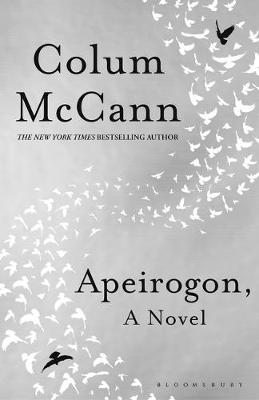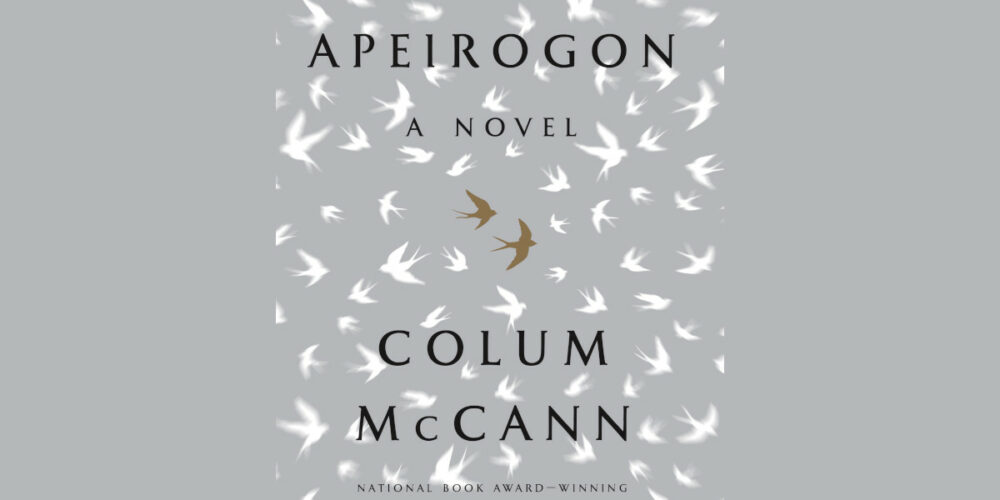Colum McCann, Apeirogon (London: Bloomsbury, 2020)
In the context of the recent escalation of violence in the Middle East, and Ireland’s condemnation de facto of Israel’s annexation policy, this book by Colum McCann is worth reading more than ever.

Unlike a pentagon, an apeirogon has an infinite number of sides, or aspects. The title of the novel gives the reader an indication of the innumerable facets that form this novel; and yet at its core is the undisputed fact that the state of Israel is guilty of sustained human rights abuse against the people of Palestine.
McCann tells the true story of a Palestinian, Bassam Aramin, and an Israeli, Rami Elhanan, and their daughters: Abir Aramin, aged ten, killed by a rubber bullet in 2007, and Smadar Elhanan, aged thirteen, killed by suicide bombers in 1997. Bassam Aramin and Rami Elhanan met through the organisation Combatants for Peace.
The novel’s structure resembles the workings of the mind. It “jumps” from one thought to the next, each idea prompted by an aspect of the previous one. This narrative style creates a network of connections spanning the globe. Human rights abuses form a pattern that includes the Middle East.
Rubber bullets were first used by the British state in Northern Ireland, killing children there. And the use of deadly explosives is explored in many tangents, including the dropping by the United States of atomic bombs on Hiroshima and Nagasaki.
Like the mind when it has to take in an enormity, it cannot constantly dwell on it. In order to take in a tragedy the mind keeps returning to the fact, with breaks, circling it, slowly grasping it over an expanse of time. In this way the narrative never loses sight of the killings of Abir Aramin and Smadar Elhanan. Each time we return to them new aspects are added, their stories and those of their families etched more and more clearly.
The novel is structured like the Arabian Nights, counting five hundred sections ascending in order and five hundred descending, with a section entitled 1001 in the middle. A great number of these fragmented sections are devoted to migratory birds, which seem to form part of the web that holds the global and yet local story together.
The personal is set in a larger political context. Neither strand of the novel loses sight of the other. To give a small example, McCann turns to his homeland, Ireland, and to the conflicted north of the country in particular, to draw parallels. Here the descendants of the Elizabethan settlers, the unionists, fly Israeli flags, while the community that might be forgiven for feeling occupied by a coloniser identifies with the Palestinians.
McCann never appeases the Israeli state.
Mordechai Vanunu, a nuclear technician whose job it was to produce lithium-6 in the Dimona nuclear plant in the Negev, was sentenced to eighteen years in prison for divulging details of Israel’s weapons program. Vanunu smuggled a 35 mm camera into Machon 2 and took fifty-nine photographs despite signing a secrecy agreement years earlier. He divulged the details first to a church group in Australia where he fled. Later, in London, where he went to publish the information, he was seduced in a honey-trap operation by a Mossad agent. He met the female agent again in Rome where he was overpowered, drugged, kidnapped, bound to a stretcher, driven by motorboat out to a spy ship, bundled into a cabin. He was interrogated by Mossad agents, whisked back to Israel to a secret prison run by the Shin Bet. Nearly twelve of his years in prison were spent in solitary confinement.
Which side the United States is on in the Middle East conflict is apparent in several episodes, for example when Bassam Aramin insists on an inquiry into the death of his daughter (having had to pay for an autopsy himself). The judge, who defied all efforts to prevent this, travels to the site of the attack and finds “the responsibility of the State of Israel. It has been determined.”
Following this “landmark” judgement, “several newspaper articles were published in Israel and the United States deploring the judge’s decision.” And when Bassam Aramin visits the American senator John Kerry in his office there is a recognition—“The American rifle. The American jeep. The American training. The American tear gas. The American dollar”—as central to Israeli state violence.
McCann does not paint a black-and-white picture. The parents of Smadar Elhanan do not side with their state. Her father, Rami, has developed this position over time, while her mother, Nurit, openly supports Palestinians, and frequently receives abuse and death threats.
Abir Aramin’s father, Bassam, was incarcerated at the age of seventeen for seven years, for throwing stones. He comes from a tradition of struggle against the occupation. McCann never leaves any doubt about where his sympathies lie. Close to the end he writes in the descending section 94, returning to his title word once more:
From the Greek, apeiron: to be boundless, to be endless. Alongside the Indo-European root of per: to try, to risk.
McCann takes risks. One of these is selling the film rights to Steven Spielberg, who has famously stated:
From my earliest youth, I have been an ardent defender of Israel . . . And because I am proud of being Jewish, I am worried by the growing anti-Semitism and anti-Zionism in the world . . . If it became necessary, I would be prepared to die for the USA and for Israel.
One wonders how many sides will be left of McCann’s Apeirogon: five, or six?






